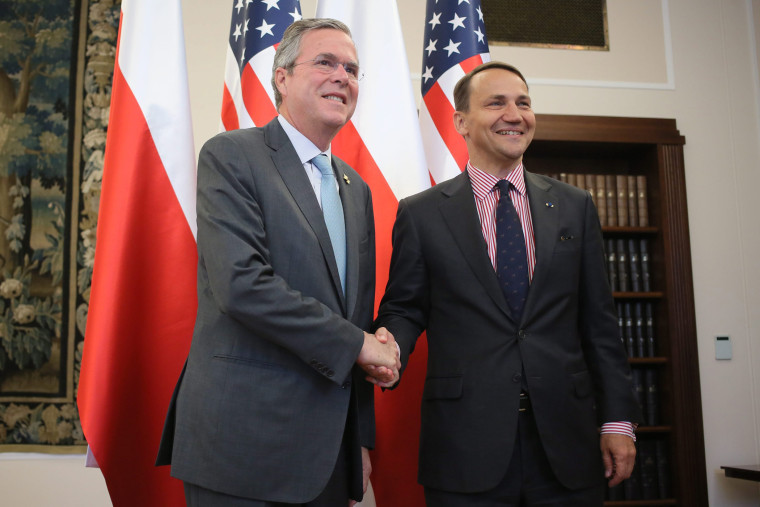In the world of European politics, a scandal known as "Waitergate" has turned into a pretty big deal. But just as important for an American audience, the story ended up connecting to the U.S. presidential race in an unexpected way this week.
The controversy stems from a tiny microphone in a Warsaw restaurant that recorded some unexpected remarks from Polish officials last year. The Washington Post reported yesterday that "four Polish government ministers and the speaker of parliament abruptly resigned" as a result of the revelations.
Of particular interest, however, is Radosław Sikorski, Poland's foreign minister at the time, who was recorded describing Poland's alliance with the United States as "worthless" and "bulls***." Sikorski, widely seen as being friendly with the U.S., was also heard saying, "We'll get into a conflict with the Russians and the Germans, and we'll think that everything is super because we gave the Americans a b*** j**. Losers. Complete losers."
The story roiled Polish politics, and Sikorski, who later became speaker of parliament, resigned on Wednesday.
How does this relate to U.S. politics? Jeb Bush met with Sikorski a day later, despite what he said about the United States and the American alliance with Poland. MSNBC's Benjy Sarlin reported:
Walking delicately around one potential minefield, Bush met Radek Sikorski, who was the country’s parliamentary speaker before he resigned over a leaked tape of comments he made decrying the United States as a “worthless” ally.
Asked about Sikurski's criticisms of Bush's own country, the Republican added, "Maybe there's a degree of frustration that over the last few years we've kind of changed course as it relates to the deployment of the missile system, for example.... So perhaps he was expressing frustration."
The moral of the story: Republicans are capable of extraordinary creativity when blaming President Obama for everything. In this case, a Polish leader had some crude and inappropriate things to say about the United States, and not only will Bush meet with him anyway, Bush will even blame the whole mess on the White House.
As for the bigger picture, John Dickerson had a good piece in Slate this week questioning the value of candidates checking a box by making overseas trips.
They promote a Holiday Inn Express theory of presidential travel. Candidates take these trips, refer to them to give ballast to their foreign policy views, but then they don't talk about what they actually learned that gave them the expertise that they hope we see in them. Candidates want us to believe that they learned something -- otherwise, why bother going? -- but don't want to admit it because anything that seems too revelatory might be a fact you should already have known.
Looking back over the last several cycles, I'd say these trips tend to offer more dangers than rewards. If a candidate goes abroad and manages to avoid gaffes, diplomatic slip-ups, or general embarrassments, the political world tends to overlook the sojourns as uneventful and uninteresting. If a candidate's trip goes horribly -- see Romney, Mitt in the U.K. -- he or she ends up looking wholly unprepared for international leadership.
There are exceptions -- Barack Obama's 2008 trip to Germany made him look like a heroic figure with broad global support -- but in general, it's a lot easier to "lose" these trips than to "win."
Maybe candidates should stop taking them?
